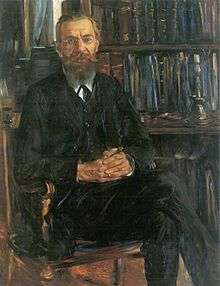Eduard Meyer
Eduard Meyer (25 January 1855 – 31 August 1930) was a German historian. He was the brother of Celticist Kuno Meyer (1858–1919).

Biography
Meyer was born in Hamburg and educated at the Gelehrtenschule des Johanneums[1] and later at the universities of Bonn and Leipzig. After completing his studies, he spent one year in Istanbul. In 1879, he went to the University of Leipzig as privatdocent. He was appointed professor of ancient history at Breslau in 1885, at Halle in 1889, and at Berlin in 1902. He lectured at Harvard in 1909 and the University of Illinois, Urbana-Champaign in 1910. Honorary degrees were given him by Oxford, St. Andrews, Freiburg, and Chicago universities.
He died in Berlin.
Egyptology
In 1904 Meyer was the first to note the Sothic cycle of the Heliacal rising of Sirius, which forms the basis for the traditional chronology of Egypt.
Works
His principal work is his "Geschichte des Altertums" (1884-1902; third edition, 1913). He also published:
- Forschungen zur alten Geschichte (1892-1899) – Research of ancient history.
- Untersuchungen zur Geschichte der Gracchen (1894) – Investigations on the history of the Gracchi.
- Wirtschaftliche Entwicklung des Altertums (1895) – Economic development of the ancient world.
- Die Entstehung des Judentums (1896) – The origins of Judaism.
- Zur Theorie und Methodik der Geschichte (1902) – Theory and methodology of history.
- Israeliten und ihre Nachbarstämme (1906) – The Israelites and their neighboring tribes.
- Theopomps Hellenika (1909) – Theopompus' Hellenics.
- Der Papyrosfund in Elephantine (1912) – The papyrus discovery from Elephantine.
- Ursprung und Geschichte der Mormonen (1912) – Origin and history of the Mormons.
- Nordamerika und Deutschland (1915) – North America and Germany.
In English translation
- "Alexander the Great and Universal Monarchy," The International Quarterly, Vol. VIII (1903).
- England; its Political Organization and Development and the War Against Germany (1916).[2]
He was also a contributor to the Encyclopaedia Biblica (1903) and 1911 Encyclopædia Britannica.
Notes
- Momigliano, Arnaldo (1994). "Introduction to a Discussion of Eduard Meyer." In: A. D. Momigliano: Studies on Modern Scholarship. Berkeley: University of California Press, p. 209.
- Robertson, J.M. (1917). Britain Versus Germany; an Open Letter to Professor Eduard Meyer. London: T. Fisher Unwin Ltd.
References
- This article incorporates text from a publication now in the public domain: Gilman, D. C.; Peck, H. T.; Colby, F. M., eds. (1905). New International Encyclopedia (1st ed.). New York: Dodd, Mead. Missing or empty
|title=(help) - This article incorporates text from a publication now in the public domain: Rines, George Edwin, ed. (1920). . Encyclopedia Americana.
- Calder, William Musgrave and Alexander Demandt, ed. (1990). Eduard Meyer: Leben und Leistung eines Universalhistorikers. Leiden: BRILL.